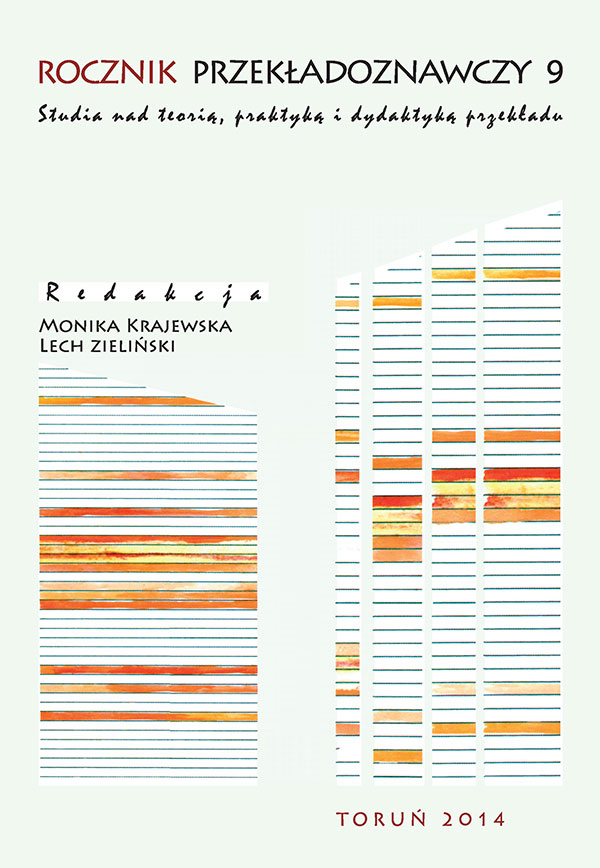Text and context. English translation of Norwid’s insurgent lyric
DOI:
https://doi.org/10.12775/RP.2014.004Keywords
translation of poetry, context, textAbstract
Norwid’s poem Blessed peace is ambiguous. Those who know the context of its origins interpret its sense as a bitterly ironic reflection upon the course of the January Uprising (1863) and the tendency of Poles to participate in ill-prepared patriotic rebellions. Some reviewers, however, propose to interpret the poem in isolation from the situation which gave origins to it. Then they understand its meaning as cheerful and praising the effort which brings victory. The readers of the translation do not know Polish historical contexts which determine the first interpretation of the original text. Thus they are more inclined to arrive at the second possible interpretation of the poem (the positive one). However, the one and only translation of Norwid’s lyric was published in 1944 and done during World War II by a translator who strove to achieve three separate objectives: that of introducing the Polish poets to the English-speaking world; that of giving access to the Polish ethos as expressed in Polish literature to the students of the Polish thought, customs and manners; and that of assisting the many British students of Polish. Such multiplicity of purpose has forced a compromise in translating which consisted in rendering poetry by prose. This method of translation (although controversial) did not affect the poem’s meaning. What influenced the structure and the sense of its translation was the double address of the bilingual anthology, which was intended for both English and Polish readers. Moreover, it was meant to console Polish soldiers fighting in England and give them hope for victory and regaining their homeland. Thus the translation was placed in the fifth and last chapter of the book: The Dawn of Spring which expressed “the birth of hope, the certainty of a new and better world to come, in which man shall have real freedom and true equality, and Poland take her place again among the great nations”. This very placement of the translation together with depriving it of translator’s commentaries or footnotes explaining all the references of the poem to the Polish history and politics gave it a new, very optimistic meaning. This is in itself paradoxical because the aim of the whole book was to discover or explain the nature of Polishness which has very little to do with optimism.
References
A Polish Anthology, including an original English translation, along with the Polish text. A book for all friends of Poland, who wish to understand something of the Polish ethos, literature and language, as well as for the Polish themselves, selected by T.M. Filip, translated by M.A. Michael / Moja ojczyzna-polszczyzna. Wybór poezji polskiej z utworów Mickiewicza, Słowackiego, Norwida, Wyspiańskiego, Żeromskiego, Tuwima i innych, z przekładem na angielski M.A. Michaela, w opracowaniu T.M. Filipa [Tytusa Filipowicza], Edinburgh 1944.
Balcerzan, E., Rajewska E., 2007, Pisarze polscy o sztuce przekładu 1440–2005, Poznań.
Barańczak, S., 2004, „Mały, lecz maksymalistyczny manifest translatologiczny”, [w:] tenże, Ocalone w tłumaczeniu, wydanie 3, poprawione i znacznie rozszerzone, Kraków, s. 13–62.
Bilczewski, T., 2010, Komparatystyka i interpretacja. Nowoczesne badania porównawcze wobec translatologii, Kraków 2010.
Brajerska-Mazur, A., 1991/1992, „Norwid w tłumaczeniach Adama Czerniawskiego”, [w:] Studia Norwidiana, nr 9–10, s. 264–280.
Brajerska-Mazur, A., 1999–2000, „Bibliografia przekładów utworów Norwida na język angielski”, [w:] Studia Norwidiana, nr 17–18, s. 385–393.
Brajerska-Mazur, A., 2002, O angielskich tłumaczeniach utworów Norwida, Lublin.
Brajerska-Mazur, A., 2004, „Adam Czerniawski i Selected Poems Norwida”, [w:] Studia Norwidiana, nr 22, s. 293–308.
Brajerska-Mazur, A., 2004, „Norwid w tłumaczeniach Jerzego Pietrkiewicza”, [w:] Pamiętnik Literacki, XCV, z. 1, s. 151–174.
Brajerska-Mazur, A., 2004, „Norwid w tłumaczeniu M.J. Mikosia”, [w:] Studia Norwidiana, nr 22, s. 273–284.
Brajerska-Mazur, A., 2007, „Bibliografia przekładów utworów Norwida na język angielski II”, [w:] Studia Norwidiana, nr 24–25, s. 387–391.
Brajerska-Mazur, A., 2008, „Norwid w tłumaczeniu Teresy Bałuk”, [w:] Przegląd Humanistyczny, nr 3, s. 41–60.
Brajerska-Mazur, A., 2008, „Ten Commandments for the Translation of the Works of Cyprian Norwid (and what came from them, or, on the translations of Danuta Borchardt)”, [w:] The Polish Review, Vol. LIII, No. 4, s. 495–540.
Brooke-Rose, Ch., 1958, „Cyprian Norwid. Twelve Poems”, [w:] Botteghe Oscure, Vol. XXII, s. 191–199.
Gomulicki, J.W., 1966, Norwid. Dzieła zebrane, oprac. J.W. Gomulicki, Warszawa.
Kuczera-Chachulska, B., 1998, „Czas siły-zupełnej”: o kategorii wysiłku w poezji Norwida, Lublin.
Downloads
Published
Issue
Section
Stats
Number of views and downloads: 1040
Number of citations: 0



